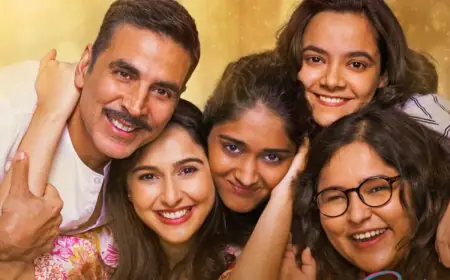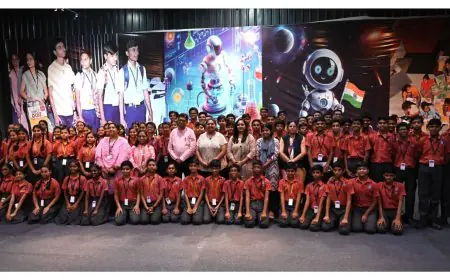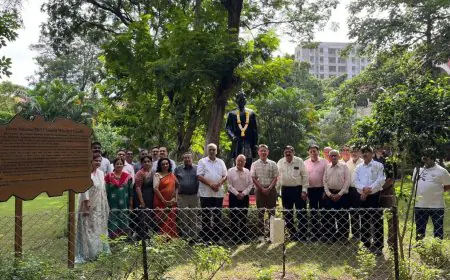'Grind Now, Enjoy Later..': CA Shares How Her Kid's Drawing Shifted Her Perspective On Hustle Culture
Nitu Mohanka, a chartered accountant-turned-mindset coach recently shared a heartwarming post on the social media platform Instagram, that has sparked renewed conversations about the harmful effects of hustle culture on personal lives. In her post, Mohanka shared her experience of putting work above family for years, describing how her gruelling 14-hour workdays and late-night emails led her to miss crucial moments, such as her daughter’s first steps. The turning point for Mohanka came with a drawing made by her five-year-old daughter. ‘It was a family picture, but I wasn’t in it,” Mohanka wrote. “When her teacher asked why, she said, ‘Mama is always at the office.’” The drawing now serves as a constant reminder on her desk of the personal toll taken by prioritising work above everything else. View this post on Instagram A post shared by Nitu Mohanka I Mindset and Life Coach (@nitumohanka) “Hustle culture is seductive, but the promise of ‘grind now, enjoy later’ rarely delivers,” Mohanka wrote in her post. She stressed that equating success with long hours instead of meaningful impact comes at a high cost. Highlighting research, she pointed out that productivity sharply declines after 55 hours of work each week, with burnout, reduced creativity, and strained personal relationships often following excessive work hours. Mohanka’s reflection came at a time when there was a significant public backlash against comments made by L&T Chairman SN Subrahmanyan, who advocated for a 90-hour workweek. In a now-viral video from an internal meeting, Subrahmanyan expressed his disappointment over not being able to make employees work on Sundays. “I regret that I am unable to make you work on Sundays. If I could, I would be happier because I work on Sundays,” Subrahmanyan said. He further questioned the value of spending time at home, adding, “What do you do sitting at home? How long can you stare at your wife? How long can the wives stare at their husbands? Come on, get to the office and start working.” These remarks, widely criticized as out of touch and dismissive, triggered a backlash online. Critics argued that such expectations were unrealistic, especially for employees who lack the financial security and support systems enjoyed by top executives. Subrahmanyan’s comments came amid a similar controversy stirred by Infosys co-founder Narayana Murthy, who recently proposed a 70-hour workweek to boost India’s productivity. Both statements have reignited a larger conversation about work-life balance in India, with many people arguing that these expectations disregard the challenges of mental health and personal commitments. Mohanka’s post resonated with several internet users. One of the Instagram users wrote, “They want a lavish and stable life for themselves by making people work for them forever. It's endless hours of working with you missing out on your important events and milestones in life. It's important to earn to live a better life but not at the cost of losing out everything in life for which you are actually striving. The question is why they don't value quality over quantity of work.” Also Read: Gold Rate Today (January 19): Check Out Gold Prices In Delhi, Mumbai, Bengaluru, Ahmedabad, More Cities

Nitu Mohanka, a chartered accountant-turned-mindset coach recently shared a heartwarming post on the social media platform Instagram, that has sparked renewed conversations about the harmful effects of hustle culture on personal lives. In her post, Mohanka shared her experience of putting work above family for years, describing how her gruelling 14-hour workdays and late-night emails led her to miss crucial moments, such as her daughter’s first steps.
The turning point for Mohanka came with a drawing made by her five-year-old daughter. ‘It was a family picture, but I wasn’t in it,” Mohanka wrote. “When her teacher asked why, she said, ‘Mama is always at the office.’” The drawing now serves as a constant reminder on her desk of the personal toll taken by prioritising work above everything else.
View this post on Instagram
“Hustle culture is seductive, but the promise of ‘grind now, enjoy later’ rarely delivers,” Mohanka wrote in her post. She stressed that equating success with long hours instead of meaningful impact comes at a high cost. Highlighting research, she pointed out that productivity sharply declines after 55 hours of work each week, with burnout, reduced creativity, and strained personal relationships often following excessive work hours.
Mohanka’s reflection came at a time when there was a significant public backlash against comments made by L&T Chairman SN Subrahmanyan, who advocated for a 90-hour workweek. In a now-viral video from an internal meeting, Subrahmanyan expressed his disappointment over not being able to make employees work on Sundays.
“I regret that I am unable to make you work on Sundays. If I could, I would be happier because I work on Sundays,” Subrahmanyan said. He further questioned the value of spending time at home, adding, “What do you do sitting at home? How long can you stare at your wife? How long can the wives stare at their husbands? Come on, get to the office and start working.”
These remarks, widely criticized as out of touch and dismissive, triggered a backlash online. Critics argued that such expectations were unrealistic, especially for employees who lack the financial security and support systems enjoyed by top executives.
Subrahmanyan’s comments came amid a similar controversy stirred by Infosys co-founder Narayana Murthy, who recently proposed a 70-hour workweek to boost India’s productivity. Both statements have reignited a larger conversation about work-life balance in India, with many people arguing that these expectations disregard the challenges of mental health and personal commitments.
Mohanka’s post resonated with several internet users. One of the Instagram users wrote, “They want a lavish and stable life for themselves by making people work for them forever. It's endless hours of working with you missing out on your important events and milestones in life. It's important to earn to live a better life but not at the cost of losing out everything in life for which you are actually striving. The question is why they don't value quality over quantity of work.”
What's Your Reaction?











































